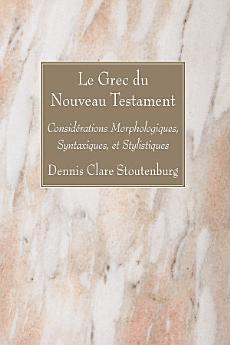Le Grec du Nouveau Testament: Considerations Morphologiques, Syntaxiques, et Stylistiques
Jan 2024 · Wipf and Stock Publishers
5.0star
1 reviewreport
Ebook
714
Pages
family_home
Eligible
info
reportRatings and reviews aren’t verified Learn More
About this ebook
Dennis Clare Stoutenburg successfully completed the doctorate at the University of Strasbourg, France during which time he studied Histoire Modern with Luther scholar, Marc Lienhard, professor for the Centre d'Etudes OEcumeniques (Center for Ecumenical Studies, created by the Lutheran World Federation). In preparation, Stoutenburg previously studied ecclesiastical history under the direction of Professor John Woodbridge, Research Professor of Church History and the History of Christian Thought. Woodbridge - who formerly earned the doctorate and taught at the University of Toulouse, as well as at the Hautes Etudes, Sorbonne, in France - was the primary inspiration in encouraging Stoutenburg to continue his studies in France. During five years of research for Luther's Exegetical Use of James, in which Stoutenburg read Luther's Works in its entirety three times, he corresponded with emeritus professor Roland Bainton (Here I Stand: A Life of Martin Luther) about his findings that included evidence that Luther originally based his September Testament of 1520 on Erasmus' critical Greek edition that excluded the antilegomena, including James. However, in the December Testament of the same year, Luther had not only reintroduced the antilegomena but also numbered them in the original canonical order of the 27 books, countering Erasmus' initial influence on Luther. Stoutenburg offers compelling evidence that Luther not only respected James as a canonical text, but contextualizes passages that historians argue would otherwise support a view that Luther rejected James from the canon, instead arguing that dismissal of the book should be ascribed to subsequent schools of Luther scholarship rather than to Luther himself.
Ratings and reviews
5.0
1 review
About the author
Dennis Clare Stoutenburg successfully completed the doctorate at the University of Strasbourg, France during which time he studied Histoire Modern with Luther scholar, Marc Lienhard, professor for the Centre d'Etudes Œcumeniques (Center for Ecumenical Studies, created by the Lutheran World Federation). In preparation, Stoutenburg previously studied ecclesiastical history under the direction of Professor John Woodbridge, Research Professor of Church History and the History of Christian Thought. Woodbridge - who formerly earned the doctorate and taught at the University of Toulouse, as well as at the Hautes Etudes, Sorbonne, in France - was the primary inspiration in encouraging Stoutenburg to continue his studies in France. During five years of research for Luther's Exegetical Use of James, in which Stoutenburg read Luther's Works in its entirety three times, he corresponded with emeritus professor Roland Bainton (Here I Stand: A Life of Martin Luther) about his findings that included evidence that Luther originally based his September Testament of 1520 on Erasmus' critical Greek edition that excluded the antilegomena, including James. However, in the December Testament of the same year, Luther had not only reintroduced the antilegomena but also numbered them in the original canonical order of the 27 books, countering Erasmus' initial influence on Luther. Stoutenburg offers compelling evidence that Luther not only respected James as a canonical text, but contextualizes passages that historians argue would otherwise support a view that Luther rejected James from the canon, instead arguing that dismissal of the book should be ascribed to subsequent schools of Luther scholarship rather than to Luther himself.
Rate this ebook
Tell us what you think.
Reading information
Smartphones and tablets
Install the Google Play Books app for Android and iPad/iPhone. It syncs automatically with your account and allows you to read online or offline wherever you are.
Laptops and computers
You can listen to audiobooks purchased on Google Play using your computer's web browser.
eReaders and other devices
To read on e-ink devices like Kobo eReaders, you'll need to download a file and transfer it to your device. Follow the detailed Help Center instructions to transfer the files to supported eReaders.
